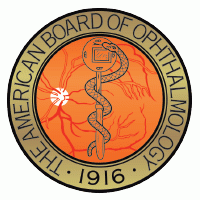The ITO pathway to certification is designed to ensure that the applicant satisfies experience and performance requirements that meet the core competencies developed by the Accreditation Council for Graduate Medical Education (ACGME) and the American Board of Medical Specialties (ABMS), as described below. That is, the applicant should have comparable qualifications to an ophthalmologist who has graduated from an ACGME-accredited or RCPSC-accredited residency, details of which are available here.
A. Professionalism
Carrying out professional responsibilities, adherence to ethical principles, and sensitivity to diverse patient populations.
A. 1. Licensure: Applicants must hold a valid and unrestricted license(s) to practice medicine in the United States for a minimum of five (5) consecutive years. A license that permits practice only at a specific academic institution is not considered “unrestricted” for the purposes of this pathway. Copies of all active licenses are required with the application. Documentation of Board certification or equivalent in the applicant’s country of training (if applicable) must be submitted.
A. 2. Peer Letters of Recommendation: The ABO must receive three (3) letters of recommendation from physicians currently certified by the American Board of Ophthalmology. The letters must include the following information:
- How long the applicant has been known and in what capacity
- If any actions or restrictions have been made against the applicant’s medical license or clinical privileges
- If the applicant exhibits the professionalism expected of an ABO Diplomate
- If the applicant has been observed in the care of patients, in the office and in the operating room, and if so, to provide an assessment on their surgical and clinical skills, interpersonal skills, and communication skills.
A. 3. Personal Statement and CV: A personal statement of up to 500 words describing the applicant’s interest in pursuing ABO Board Certification and the applicant’s current curriculum vitae are required.
A. 4: Attestation and Agreement: All applicants must agree to the application agreement. See Attachment 1.
B. Medical Knowledge
Knowledge about established and evolving biomedical, clinical, and cognate sciences and their application in patient care.
B. 1. Medical School: Documentation of completion of medical school and certification of medical school training from the Educational Commission for Foreign Medical Graduates (ECFMG) is required. A copy of the ECFMG certificate must be included with the application.
B. 2. Postgraduate Training: Documentation (translated to English) of completion of postgraduate training, including a minimum of forty-eight (48) months of clinical training with at least twelve (12) months spent in primary medical care and thirty-six (36) months in ophthalmology is required. Documentation must also include:
- Name, location, and contact information for all institution(s) where the training was obtained;
- Beginning and completion dates of training;
- Complete program curriculum (rotation schedule) by year;
- Detailed description of education activities, including didactic schedule;
- Detailed description of types and number of each surgical procedure performed; and
- Detailed description of evaluation process and approval for program completion.
C. Patient Care and Procedural Skills
Care that is compassionate, appropriate, and effective treatment for health problems and to promote health.
C. 1. Attestation of Ophthalmic Practice: A summary description of the applicant’s current ophthalmic practice, including the volume and disease categories of patients seen and surgical procedures performed is required. All applicants must have been practicing in the United States for a minimum of five (5) consecutive years.
C. 2. Surgical Privileges: Documentation of surgical privileges and/or information on participation in Ongoing Professional Practice Evaluation (OPPE) and/or Focused Professional Practice Evaluation (FPPE) if applicable is required. Privileges limited to laser or other non-incisional procedures are not sufficient for this requirement.
D. Interpersonal and Communication Skills
Skills that result in effective information exchange and teaming with patients, their families, and professional associates.
D. 1. Peer Letters of Recommendation: As noted above, the ABO must receive three (3) letters of recommendation from physicians currently certified by the American Board of Ophthalmology.
E. Practice-Based Learning and Improvement
Investigate and evaluate patient care practices, assimilate scientific evidence, and improve practice.
E. 1. Participation in an Improvement in Medical Practice Activity: Once an applicant is approved to participate in the ITO program by meeting the requirements outlined above (A-C), he/she must then complete an Improvement in Medical Practice activity through the ABO. This requires participants to design an individualized Improvement in Medical Practice project using a standard quality improvement methodology, such as the Plan-Do-Check-Act (PDCA) cycle. Examples of such projects can be found on the ABO’s website here.
F. Systems-Based Practice
Awareness of, and responsibility to, systems of health care. Ability to call on system resources to provide optimal care.
F. 1. Participate in an Activity Designed to Promote Patient Safety: Once an applicant is approved to participate in the ITO program by meeting the requirements outlined above (A-C), he/she must then complete an activity designed to promote patient safety. To meet the patient safety requirement using a CME activity that qualifies as patient safety, visit the ABMS’ Continuing Certification Directory, filter for Patient Safety, and select from the list of options. Participants are not permitted to use the Quarterly Questions® pathway.


